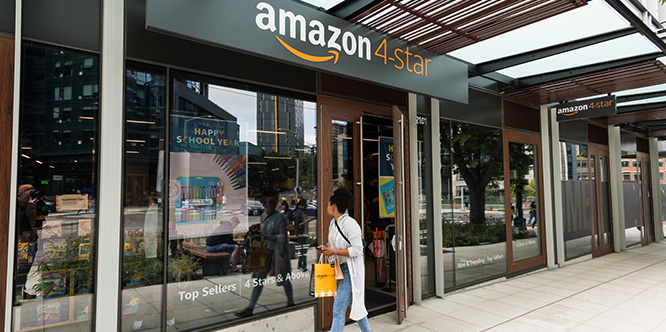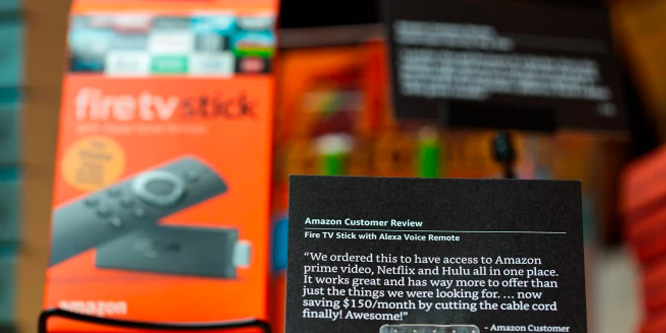
Photo: Getty Images/400tmax
Is Amazon 4-Star a winner?
A year after the first Amazon 4-Star opened in fall 2018, a Financial Times review predicted the concept “could be the future of bricks-and-mortar retail.”
“My first thought on wandering around the store was that it is a kind of walk-in website, my second that this is a fatuous expression worthy only of a PR release,” FT’s tech columnist Jonathan Margolis wrote of his visit to the first location in New York’s SoHo neighborhood.
He goes on to describe how shelves ”filled with a quirky selection of goods chosen, supposedly, by real customers, made for a seductive shopping experience,” and that he spent “more than $100 on essentials I was unaware I needed, including products I didn’t even know existed.”
He concludes, “I am sure 4-Star is a winner, even for those of us aware of the downsides of Amazon.”

Amazon has slowly expanded the number of 4-Star locations since its launch, currently having 32 in the U.S. and now its first international location in central London.
The 4-Star formula hasn’t changed much since launch:
- At around 4,000 square feet, 4-Star offers a range of consumer electronics, toys, games, books, kitchen and home items rated four stars or higher by Amazon.com customers, or are top sellers or new and trending on Amazon.com. Amazon-owned devices and smart home accessories are prominently featured.
- Described as “an extension of Amazon.com,” the stores make use of familiar online groupings such as “Most Wished For,” “Most Gifted,” and “Top Rated” as well as “If You Like, Then You’ll Love” pairings. Local items trending online are highlighted.
- Prime members receive the same discounted pricing as online.
A recent review by Modern Retail noted that 4-Star stands out among Amazon’s various store concepts, which also includes Amazon Books, Amazon Fresh and Amazon Pop Up, by working as a tourist attraction with its foremost focus on discovery.
Elaine Kwon, managing partner at e-commerce management firm Kwontified, believes 4-Star may have to pivot in a few years. She told Modern Retail, “I feel like maybe the 4-Star store has the least likelihood of lasting because it serves as a novelty store.”
- Amazon’s 4-Star stores could be the future of bricks-and-mortar retail – Financial Times
- Introducing Amazon 4-star – Amazon.com
- Amazon 4-Star – Amazon.com
- Amazon 4-star opens in the UK, marking its first international expansion – Amazon.com
- Amazon Physical Store Locations – Amazon.com
- A little bit of an anomaly’: How 4-Star stores fit into Amazon’s physical retail strategy – Modern Retail
Discussion Questions
DISCUSSION QUESTIONS: Is Amazon 4-Star a proven concept or do you see it being overhauled or phased out in coming years? Do you see opportunities for other broadline retailers to offer similar competitive formats?


I’d hardly call 32 stores a winning concept, but it has potential. The concept makes great sense, but I think it loses much in the translation from online to a physical space. Given Amazon’s resources, I suspect that they could turn this into a very successful store format if they chose. Since online star ratings are so closely associated with Amazon, this doesn’t feel like an opportunity for other retailers to offer competitive formats.
We do seem to be jumping the gun on “success.” Amazon’s reputation precedes it, I suspect. That said, I’m not sure that it’s warranted, looking at Whole Foods. We really haven’t seen Whole Foods starting to gobble up market share after the Amazon purchase.
Amazon 4-Star is not revolutionary. However it is solid. The stores are pleasant, the product mix is interesting, service is pretty good, and the concept is very easy to shop. Given so many traditional retailers have become bad at retail basics, it is hardly surprising that Amazon is seeing some success with its physical retail formats.
Currently, with only 32 stores, it is difficult to predict the future of Amazon 4-Star stores. It may prove to be a novelty store that appeals to consumers that value the “treasure hunt” shopping experience. However it could be a catalyst for tangential physical store opportunities for Amazon, such as off-price stores for excess inventory from Amazon and its third-party sellers.
Amazon opened one in Denver early on. It has the potential to have a key ingredient for keeping a store fresh: changing what’s featured and bringing in/taking out products from an enormous potential selection. But the store in Denver is in a mall – a mall I haven’t been in since at least March of 2020. So that’s something to keep in mind: Amazon opened these stores across a variety of types of locations, and that may be part of the experiment. But the experiment was seriously disrupted over the last year and a half. As a result, I don’t think there’s anything “set” about 4-Star at all.
It wins in terms of generating curiosity but it is not clear why one would return. I was in that same store and felt a “one and done” feeling – I don’t need to see more.
It might be a store they can build on. My suspicion is that the limited assortment and Amazon name make it valuable – not the mythology that the goods are chosen by customers. It is, after all, simply a store with Amazon on the outside – and that’s a rare commodity.
I’m not a fan of the store layout or design. A trained eye can see they spent very little on the store experience.
It is underwhelming at best. If the industry is leaning into in-store experience as a critical means of generating revenue then this isn’t it.
Amazon 4-Star sells trust and certainty. Its carefully curated assortment of bestsellers lets shoppers relax, knowing they can’t go wrong.
While the concept may undergo reinvention, like clear delineation of categories, its positioning as a source of popular products has staying power. Shoppers appreciate this streamlined model for easier, faster purchase decisions. (An Amazon 4-Star store in Seattle impressed me and compelled me to buy.)
As more broadline retailers solicit user reviews and embrace analytics, they could launch similar formats to compete for consumer confidence.
The success and the growth of these stores is predicated on customers wanting to go somewhere to browse vs. being mission-oriented. In today’s environment the consumer doesn’t seem to be seeking that, which may shorten the shelf-life of these stores. Amazon is great at concept stores – such as 4-Star stores and Amazon Go stores – but any assumptions that concept stores will turn into hundreds or thousands of locations have proven false thus far.
The Amazon 4-Star stores have always been underwhelming. And clearly if they were really successful there would be many hundreds by now, not a few dozen. The inherent problem is they are built from a company point of view, not the customer’s, and as such remain unremarkable and a blip on the retail radar screen. But — and it’s a big but — Amazon increasingly seems to appreciate that they MUST have more of a brick-and-mortar retail presence in their future, for both marketing reasons (stores are brand advertising) and fulfillment customer service (BOPIS, BORIS, lowering of the cost of returns, particularly with their apparel push). These are learning points and I expect to see a significant evolution in the future.
These might work better as pop-ups rather than as these stores I have seen in malls. Like many of my colleagues, I have not been in a mall in three or four years. I think it’s too early to decide the concept’s success or failure but it has potential.
I love the concept of a store curated by the customer, not for the customer. And by its very nature it’s going to be a little random given the vast array of product from which the physical store content is being pulled. “Treasure hunt” indeed. It strikes me as an updated version of Sharper Image with constantly evolving content. It also sounds like it can be highly localized.
Ah, the magic of user reviews combined with curated and localized assortments. What’s not to like? (See what I did there?)
Amazon has been dancing around brick-and-mortar for years but has so far failed to crack the code. I’ve toured several 4-Star stores and felt that on the surface they seem like a good idea, but the execution falls flat. By contrast, Google’s pop-up in 2019 emphasized experience and designed the store to tell stories using the products in context so customers could get a real sense of how they would work and feel in their own lives. Amazon stores still design physical retail like surfing a website, without understanding how to woo a shopper, help them understand and experience products and, just as importantly, get to know Amazon as an overarching brand. But make no mistake, eventually Amazon will figure out brick-and-mortar and, when they do — look out.
I think Amazon 4-Star has proven itself but, the real question is, what’s the goal? If it is to grow a concept on an opportunistic basis then going from one store to 32 is great. If it is intended to be one more way of connecting to consumers and reinforcing the brand, again, that works for me — albeit on a limited scale. If Amazon thinks 4-Star will be the next big thing, sorry Jeff, I wouldn’t bet on that one. Is there an opportunity to visibly copy Amazon instead of developing your own strategy? Sure, retailers make that mistake every day.
The challenge to Amazon is to gather enough interesting products to make up an appealing assortment. The upside is that the products are known winners when they hit the 4-Star stores.
Amazon has the resources to experiment with many concepts and likely practices the fail fast process to understand what works and what does not.
Amazon’s 4-Star format will be an evolving concept as the company gains a better handle on creating a more compelling in-store experience.
The assortment leverages proven data metrics from the company’s website, but the store size and eclectic categories make for a jumbled and incoherent theme. Translating data insights into an assortment and compelling in-store experience takes a lot more than intelligent algorithms. It is clear that visual merchandising is not part of Amazon’s long list of competencies.
From an experience perspective, the 4-Star falls short. But the 4000 square foot billboard still serves its purpose. I actually enjoyed exploring the Amazon pop-up stores that had only a few select (usually Amazon) products, but was more open and designed better. The 4-Star stores miss the basic fundamentals of shopping — decluttered, clean shelving, easy to walk through, room to stop and examine, good window view and help when you need it. The tiny space almost seems compressed with items that the average consumer wouldn’t need, although broad swaths of people might. Attempting to read the signs and stars quickly became an added burden rather than a reason to buy. It played more to the average and missed on real customer personalization. Expect format changes and few copycats — it just doesn’t play well as a brick and mortar in its current state.
Amazon 4-Star feels like an impulse shopping concept to me — one that might fit best in tourist environments or transit hubs with heavy foot traffic.
Except for us retail nerd types, it is not a destination. A question worth asking: Would shoppers go out of their way to shop there? For what items?
It does serve as a bully billboard for the Amazon brand and it might generate sufficient cash flows to be a marketing vehicle that more than pays for itself.
This is an impulse store format. Being hosted by Amazon helps adoption by the general public, but the real question is, is there a true need for this “QSR” Amazon concept? After the first blush, I think not. Only time will tell.